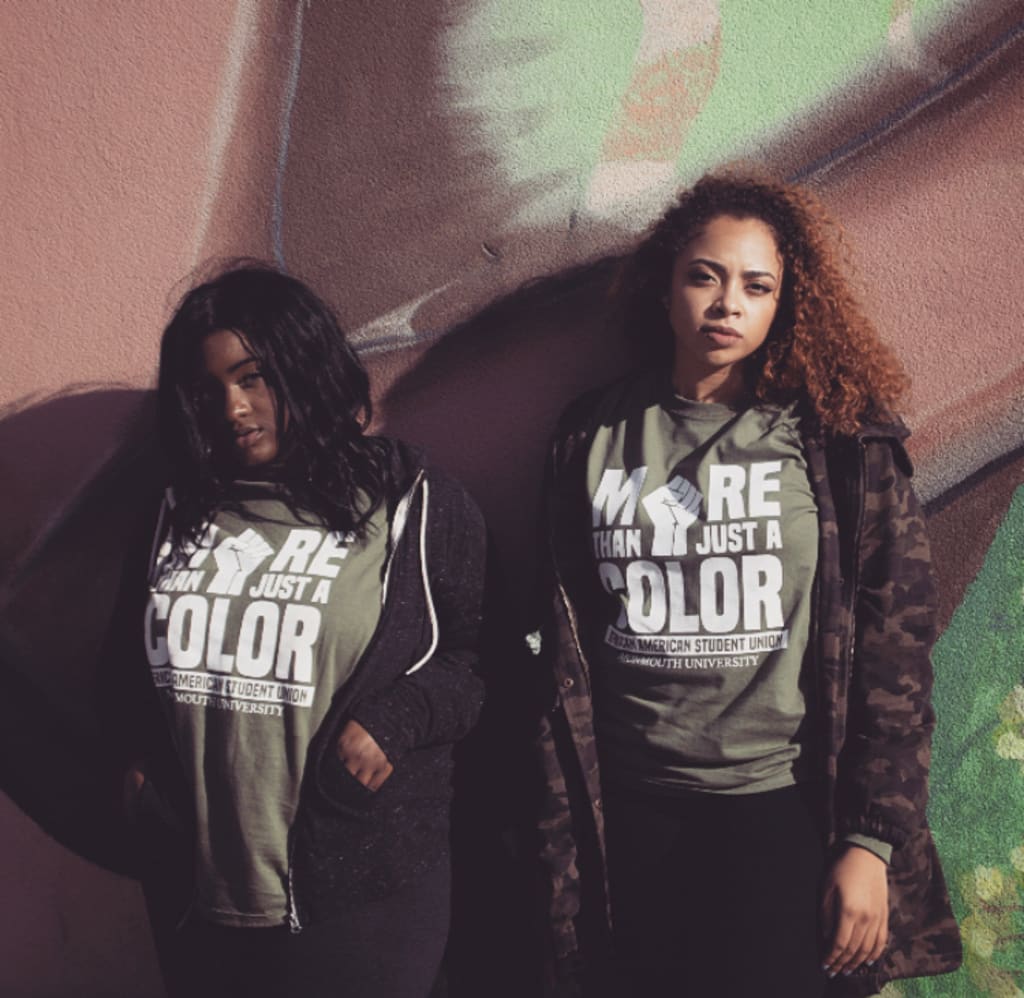Things I Wish I Knew Before Attending a Predominately White Institution
How to Survive in Your Skin on a College Campus

PWI. For the purposes of this blog and my actual life, I am not referring to Pro Wrestling Illustrated or Public Windows Interface. I am referring to what is known as a Predominately White Institution. Yes, essentially a college where I am likely to be the only person of color in the room. Majority of the faculty, students, trustees, founders, and administrators are white. White walls, white floors, whiteboard and me...brown skin.
When someone asks me why I turned down a scholarship to an esteemed HBCU (Historically Black College or University), for a medium sized, highly priced, PWI, my answer is that I needed something different. Out of the 70 girls who graduated from my high school class, the majority were Black or Hispanic and only one was white. Attending my college, was a change of scenery for me.
Tichelle Pender is a sophomore psychology student at Monmouth University in West Long Branch, New Jersey. She attends this PWI because of the prestige of the institution. According to her, she has never experienced blatant racism, but she deals with microaggressions on a day-to-day basis. These microaggressions include stereotypes about people of color and their athletic ability as opposed to their intellectual capacity. She wishes that someone would have told her that she would feel out of place often, that she would be uncomfortable, and that the staff is even less diverse than the student body.
Jasun Ramirez also attends Monmouth University and chose the institution because of its proximity to home. Like Pender, he has had similar experiences of microaggressions. He has experienced students making assumptions about the reason he can attend the university. "Sometimes the incidents are more direct where a white student talks to me as if they already know I have EOF (Educational Opportunity Fund), or I’m an athlete, so I wouldn’t know about really paying for college since to them that’s the college equivalent of affirmative action," says Ramirez. He has even had experiences where girls have just attempted to be with him, just so they can say that they have had a relationship with a black male. He feels sheltered growing up in a diverse community. "I don't think I even recognized racism as a modern problem, simply because to be a racist in my community, you'd have to be completely abnormal. I think we truly saw ourselves as people, neighbors, and friends." Ramirez did not become aware of the racism in the country until he attended college.
While attending a PWI is not always a horrible experience, it is not always a pleasant one. I have learned some lessons that I did not know I could learn about White People, but I have also learned some things about People of Color as well. If I could go back and tell myself anything about life at a school full of White People, it would be this.
1. They bring up race more than you do.
On the first night of college, I sat with my roommates explaining where I was from and was asked if I was from the "ghetto." My roommate, who was also black, and I had to explain to a group of white girls that we cannot wash our hair every day, that we wear bonnets to prevent breakage and that the heat needed to be on in the winter. We didn't bring up any questions about their race or heritage, but they had questions about ours. These questions were not always intentionally racist but still...it makes things very awkward.
2: When it's time to discuss racism—crickets.
In a numerous array of social science classes like Sociology, Race & Ethnicity and Gender, Race & Media, people had so much to say. When it came to the oppression of the Polish, the Irish, the Italians, and Native Americans people had an array of opinions. But when it came to 400 years of systematic oppression against Blacks that still exists today...crickets. No one has anything to say anymore. No one has an opinion because they're too scared to trigger a controversial debate.
3: Some people of color assimilate and forget.
One of the most frustrating parts is that there will be people of color on the campus who act too high and mighty to identify with the struggles of the people of their race. They don't stand for social causes because all their friends are white. They join white sororities and fraternities to gain popularity and they forgot that they have black parents who sit at home under the racist rhetoric of a president. They forget the very pain in the eyes of their ancestors to be popular because they're too cool to be black.
4: It hurts when they steal your culture.
Hoop earrings, extensions and weave, Timberland boots, and nameplates were all things that were "ghetto" growing up, but to them, it is a fashion staple. They drive by in their luxury cars singing the words of Kanye as if they know anything about being a black man in America. They sing about money, drugs, and guns of which they know nothing about. They've probably never seen a gun, heard a real gunshot or even know someone in jail. They know music videos and that's what they want. Sagging pants and bandanas that get black men killed in the hood is what they wear to frat parties.
Janay Tyson, a student studying Strategic Communications at Elon University in North Carolina experienced racism at a party. She and a group of friends, who were all Black, were kicked and locked out of a party. She chose Elon because she felt a connection when she toured the campus.
5: Join the African American Student Union.
Joining this organization was one of the best things I could have done. With situations of injustice happening in the country and on my very campus, these students helped facilitate growth and courage. At first, we'd sit back and watch as racism took place and we'd let that anger grow inside of us. As time went on and we grew stronger, we also grew wiser. We learned who to speak to in legislation, we fostered our own growth and sense of black pride. We studied our culture and took pride in it. We dare not let the white man depict our story wrong.
Melaney Goosby who attended the University of Toledo can relate to the importance of joining student organizations dedicated to diversity. She served as the Vice President of the Black Student Union and remembers it as a rewarding experience. During her time on the Executive Board, the Black Student Union was able to make progress and they let their presence be known.
The prestige of the University of Toledo was attractive to her as she aspired to be a social justice attorney and believed attending the institution would help her get into law school. On top of this, she was offered a scholarship and still had the opportunity to attend and be relatively close to home. Although she has never experienced racism, she admits that the school often felt segregated. Joining the Black Student Union made an impact on her overall experience.
Regardless of these shared experiences, many people have no regrets about their attendance.
"I definitely wouldn't trade my experience at my PWI for anything, because it has helped me learn and grow stronger in my sense of self. I am much more unapologetic about who I am and know how to navigate a room full of white people without doubting myself as much,” said Tyson. Pender who still has two years left is determined to stand her ground. Although she has a longing for a sense of community, she is determined to push through. "It is hard being a black female at a predominantly white institution, but I'm here and I'm still adapting, and I won't let my uncomfortableness drive me out," says Pender.
Although there are lessons I had to learn the hard way, attending a PWI has prepared me for microaggressions, judgment, and ignorance that I may face in the workplace and other social arenas. I am prepared to tackle them this time and I can only hope to educate other students going to PWI’s on the things they may experience and the ways that they may often feel.
About the Creator
Alyssa Wilson
I am a passionate writer and blogger ready to provoke interesting conversations. Check out my blog at www.shesgotalottosay.com






Comments
There are no comments for this story
Be the first to respond and start the conversation.